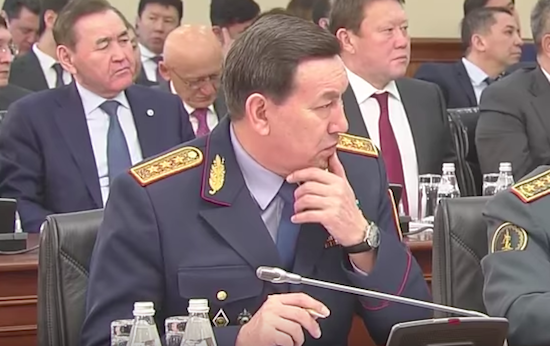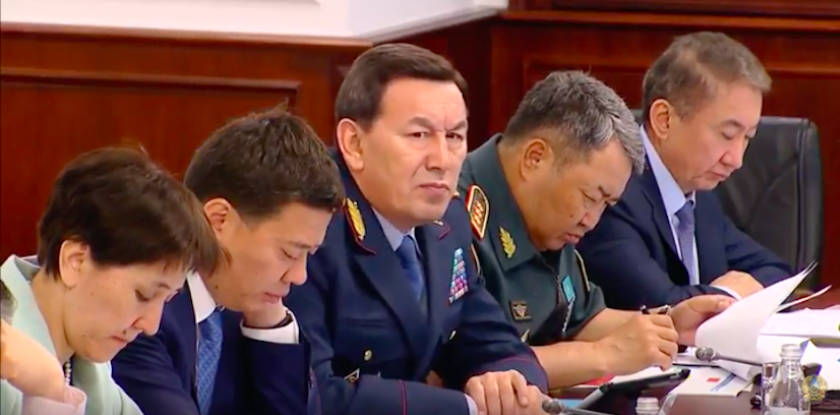Using the case of Talgat Ermegiyayev, the ex-Chairman of Astana EXPO — 2017 NC and a son of one of the President’s former allies, we have demonstrated that the relentlessness and ferocity of the on-going war among the elites in Kazakhstan go way beyond the norm. The stakes are running too high.
 KazakhSTAN 2.0 - 11.06.2018
KazakhSTAN 2.0 - 11.06.2018
New Counter-Elite and a Chance for Revanchе
With that, it is practically impossible to leave the battlefield voluntarily except perhaps if the fighter’s health is in a very poor state, and even that oftentimes happens only with Nursultan Nazarbayev’s direct approval.
To confirm our idea, we will cite the already mentioned case of Talgat Ermegiyayev.
Note that, in the summer of 2016, he was sentenced to 14 years of imprisonment in a maximum security penal colony with forfeiture of property and the life-long ban to occupy high-level positions as a state servant. Thus, it seemed as if he stopped posing any kind of threat to his political opponents and competitors. However, despite his imprisonment and the fact that he will not be freed earlier than 2026, Ermegiyayev Jr. remains a participant of the elite fighting albeit in a different capacity.
First, his case is one of the most resonant ones of the past years considering that the decision on that case was made by Nursultan Nazarbayev personally.
Second, the convicted defendant has never accepted his guilt, therefore, de-facto he has refused to follow the unofficial rules of the «game» and obey the political will of Akorda.
For this reason, Talgat Ermegiyayev and his case continue to be controlled by Akorda — the fact that was tried to be used by the participants of another elite fight to their advantage.
On January 5, 2018, the Criminal and Correctional System Committee (CCSC) of the Ministry of Interior announced the following (quotes from Sputnik Kazakhstan — kz.expert):
«Due to the violation of the correctional facility regime, convict Talgat Ermegiyayev has been placed in the disciplinary solitary for the period of 5 days and declared a worst violator of the penitentiary treatment. Before that, he had been serving his sentence on easier terms».

«The CCSC explained that the convict serving on easier terms in a maximum security facility has the right to spend the money equal up to ten monthly estimate indicators (22 thousand 690 tenge according to 2017 estimates) on groceries and living essentials per month, receive six parcels or deliveries and six wrappers per year, have four short and four long visits a year».
«State officials have been punished for showing favors to Talgat Ermegiyayev. For example, on December 20, 16 state officials were brought to different kinds of disciplinary responsibility for the violation of the law and duty. One was fired from the law-enforcement body with prejudice, 12 were released from their duties. CCSC Chief Azamat Bazylbekov and his Deputy Bekbulat Turemuratov have been warned on not being fully adequate for their positions».
Note that not a word is mentioned about the nature of the violation committed by Talgat Ermegiyayev even though the number of the CCSC employees punished for favoring him is off the charts.
Based on the insider information, Talgat Ermegiyayev has been serving his sentence in the maximum security colony near Astana the way all the people of his rank, influence, family connections and fortune serve their sentences in Kazakhstan. There were several high-rank and middle-rank officials in his barrack. However, it was his life and behavior that concerned Akorda. The political opponents of Minister of the Interior Kalmukhanbet Kasymov decided to use this circumstance to their advantage.

One of these long-life and principle opponents is Head of the Anti-Corruption Alik Shpekayev. The former Deputy of Kalmukhanbet Kasymov he was aspiring to become Kasymov’s successor as the Minister of the Interior.

According to the insiders, it was Alik Shpekayev who, with the support of Attorney General Kayrat Kozhamzharov, initiated the sudden review of Talgat Ermegiyayev’s confinement conditions which was supposedly sanctioned by Nursultan Nazarbayev himself. Supposedly, Nazarbayev was informed on the unlawful favoritism that the colony administration showed to the convict who had been severely violating his confinement conditions.
However, when the Anti-Corruption Agency’s special forces unit tried to enter the facility and review the confinement conditions in the barrack where Talgat Ermigiyayev was serving his sentence, it was met with an unexpected resistance on the part of the administration and the security of the facility. Despite having the clearance, it took three whole hours to the special forces unit to make its way through the three security check-points including the military and the prison wards.
According to the insiders, during this time, the administration, the security employees, and the wards, with the active assistance of the convicts, had completely cleared the barrack of all the illegal or potentially illegal objects and equipment.
As a result, the search was unsuccessful. According to the informed persons, the Anti-Corruption Agency employees in charge of the special forces unit were only able to accuse Talgat Ermigiyayev only of exceeding the limit of the tobacco products (more than two blocks), shoes, wearing the unapproved robe (of which he had three instead of two that are permitted), as well as wearing a foreign brand wristwatch. For this reason, his punishment was so light — only five days of solitary. The colony administration and the security employees have suffered a great deal more.
Note that all this would not have happened had it not been for the Kasymov — Shpekayev confrontation and for the latter’s attempt to strike a blow at his opponent using a suitable cause and the right mood of the state’s leader.
In our opinion, this episode of the inter-elite confrontation in which Talgat Ermegiyayev participated not as the subject but the object of it shows that the elite «war» in Kazakhstan has become so relentless and ferocious while the stakes in it are so high that creating the domestic counter-elite is now unavoidable. And since Akorda does not have a possibility to cardinally solve this problem the way it was done by Stalin and his allies in the 1930-1950s, no one should wish to find themselves in Akorda’s shoes.
On one hand, it is good for the proverbial domestic political stability in Kazakhstan since it, finally, will motivate the ruling elite to come up with and voluntarily adhere to some kind of «rules» as it happened in the USSR after Nikita Khruschev’s and especially Leonid Brezhnev’s ascend to power.
On the other hand, it is not good since not only the external but also the forming domestic counter-elite is now interested in the collapse of the current political regime in Kazakhstan. Simply for the purpose of taking the empty power spot. And if they will be able to find allies among the radical groups, for instance, those same Islamists, their success is practically secured.




